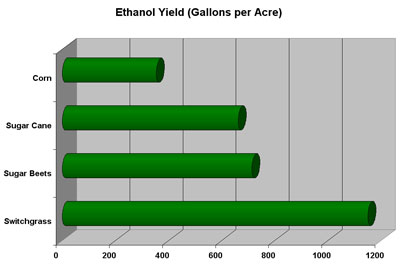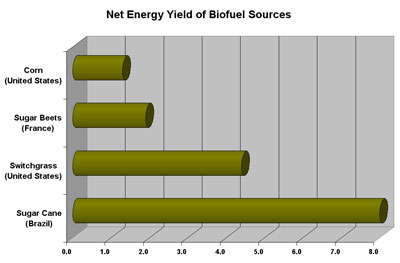U.S. needs environmental standards for biofuels
mongabay.com
October 2, 2008
|
|
The U.S. lacks criteria to ensure that cellulosic ethanol production will not harm the environment, warn scientists writing in the journal Science. The researchers say that with proper safeguards, cellulosic ethanol can help the U.S. meet its energy needs sustainably.
“Environmental standards are needed now, before the industry moves out of its research and development phase,” said Phil Robertson, Michigan State University professor of crop and soil sciences and lead author of the paper. “With production standards and incentive programs, cellulosic biofuel cropping systems could provide significant environmental benefits.”
Most ethanol produced in the United States is currently derived from corn, a relatively poor feedstock given its low yield and high fertilizer requirements which have been linked to water pollution, the expanded “dead zone” in the Gulf of Mexico, and significant greenhouse gas emissions.
|
|
Given corn’s shortcomings for energy production, scientists, policy makers, and investors have pinned a lot of hope on “next generation” biofuels derived from cellulose in agricultural waste, woody grasses and trees, but environmental concerns still remain, including the impact of non-native species, destruction of biologically-rich ecosystems, fertilizer and irrigation requirements, and the potential for greenhouse gas emissions and pollution. The new paper says that while practices that can reduce the environmental impacts of current and future ethanol feedstocks have been identified, there are few incentives or policies to ensure that they are employed.
“Policies that support long-term sustainability of both our landscapes and our atmosphere are essential if we are to chart a low-carbon economy that is substantially better than business as usual,” write the authors. “Getting to such an economy will also
require a more comprehensive and collaborative research agenda than what has been undertaken to date.”
“Decision-makers at all levels need to understand that applying best available practices to biofuel crop production will have positive impacts both on the sustainability of our working lands and on providing a long-term place for biofuels in our renewable energy portfolio, and that the policies necessary to ensure this outcome are not currently in place.
“Sustainable biofuel production systems could play a highly positive role in mitigating climate change, enhancing environmental quality, and strengthening the global economy, but it will take sound, science-based policy and additional research effort to make this so,” they conclude.
Robertson, G.P. et al. Sustainable Biofuels Redux. 3 OCTOBER 2008 VOL 322 SCIENCE
Facing criticism, biofuels industry forms new lobby group to influence lawmakers
(7/25/2008) Under attack by politicians, aid groups, and environmentalists for driving up food prices and fueling destruction of ecologically sensitive habitats, some of the world’s largest agroindustrial firms have formed a lobby group to influence consumers and lawmakers to support continued subsidies for biofuel production, reports Reuters.
Biofuels can reduce emissions, but not when grown in place of rainforests
(7/22/2008) Biofuels meant to help alleviate greenhouse gas emissions may be in fact contributing to climate change when grown on converted tropical forest lands, warns a comprehensive study published earlier this month in the journal Environmental Research Letters. Analyzing the carbon debt for biofuel crops grown in ecosystems around the world, Holly Gibbs and colleagues report that “while expansion of biofuels into productive tropical ecosystems will always lead to net carbon emissions for decades to centuries… [expansion] into degraded or already cultivated land will provide almost immediate carbon savings.” The results suggest that under the right conditions, biofuels could be part of the effort to reduce humanity’s carbon footprint.
Beyond high food prices, little to show for $11B/yr in biofuel support, says OECD report
(7/17/2008) Government support of biofuel production in rich countries is squandering vast amounts of amounts of money while exacerbating the global food crisis and failing to meaningfully curb greenhouse gas emissions and improve energy security, alleges a new report from the OECD, the club of industrialized nations.
Using farm waste for ethanol may hurt crop yields in some areas
(7/15/2008) Cellulosic ethanol proponents have pushed the idea of using farm waste as a way to boost biofuel production without impacting food crops, but such conversion may carry a hidden cost in areas with insufficient rainfall or lacking irrigation, warns a soil scientist from Washington State University.
Louisiana signs non-corn ethanol law for to procude a better biofuel
(7/1/2008) Louisiana has signed into law legislation to develop an advanced biofuel industry that excludes corn as a feedstock, reports Biopact.
Biofuel production on abandoned lands could meet 8% of global energy needs
(6/23/2008) Using abandoned agricultural lands for biofuel production could help meet up to 8 percent of global energy needs without compromising food supplies or diminishing biologically-rich habitats, reports a new study published in the journal Environmental Science and Technology.
Cellulosic biofuels may be viable alternative to gas within 5 years
(6/2/2008) A new institute in the San Francisco Bay Area is seeking to make cellulosic biofuel an economically viable alternative to corn ethanol and gasoline within the next five years. The Joint BioEnergy Institute (JBEI), a partnership between three national laboratories and three Bay Area universities, was formed in June 2007 after the U.S. Department of Energy awarded the institute a $125 million grant to develop better methods for making liquid biofuels from the natural cellulose in trees and grasses. JBEI researchers expect cellulosic biofuels to yield more energy, produce less greenhouse gases, and have less impact on the environment than other alternatives to gasoline, such as corn ethanol.
Next gen biofuels could decimate rainforests
(5/27/2008) Next generation biofuels could decimate tropical forests says a leading ecologist from the University of Minnesota.
Corn ethanol is worsening the Gulf dead zone
(3/10/2008) Proposed legislation that will expand corn-ethanol production in the United States will worsen the growing “dead zone” in the Gulf of Mexico and hurt marine fisheries, report researchers writing in the Proceedings of the National Academy of Sciences (PNAS).
UN: biofuels are starving the poor by driving up food prices
(2/14/2008) Echoing sentiments increasingly expressed by politicians, scientists, and advocates for the poor, the U.N. Food and Agriculture Organization warned that the world’s poorest people are suffering as a result of the push to use food crops for biofuel production.
Biofuels are worsening global warming
(2/7/2008) Converting native ecosystems for production of biofuel feed stocks is worsening the greenhouse gas emissions they are intended to mitigate, reports a pair of studies published in the journal Science. The studies follow a series of reports that have linked ethanol and biodiesel production to increased carbon dioxide emissions, destruction of biodiverse forest and savanna habitats, and water and air pollution.
Sustainability mandated for biofuels used in the EU
(1/24/2008) Biofuels used in the European Union will have meet strict environmental requirements said the head of the E.U.’s energy program on Wednesday.
U.S. biofuels policy drives deforestation in Indonesia, the Amazon
(1/17/2008) U.S. incentives for biofuel production are promoting deforestation in southeast Asia and the Amazon by driving up crop prices and displacing energy feedstock production, say researchers.
Cellulosic ethanol production could fight Gulf Dead Zone, help fisheries
(1/16/2008) Feedstocks for cellulosic ethanol production could help fight the massive “dead zone” that forms each year in the Gulf of Mexico as a result of current farming practices, says a University of Alabama in Huntsville biologist.
Switchgrass a better biofuel source than corn
(1/7/2008) Switchgrass yields more than 540 percent more energy than the energy needed to produce and convert it to ethanol, making the grassy weed a far superior source for biofuels than corn ethanol, reports a study published in Proceedings of the National Academy of Sciences (PNAS).
Leading biofuels wreak environmental havoc
(1/3/2008) Biofuels made from world’s dominant energy crops — including corn, soy, and oil palm — may have worse environment impacts than conventional fossil fuels, reports a study published in the journal Science.

